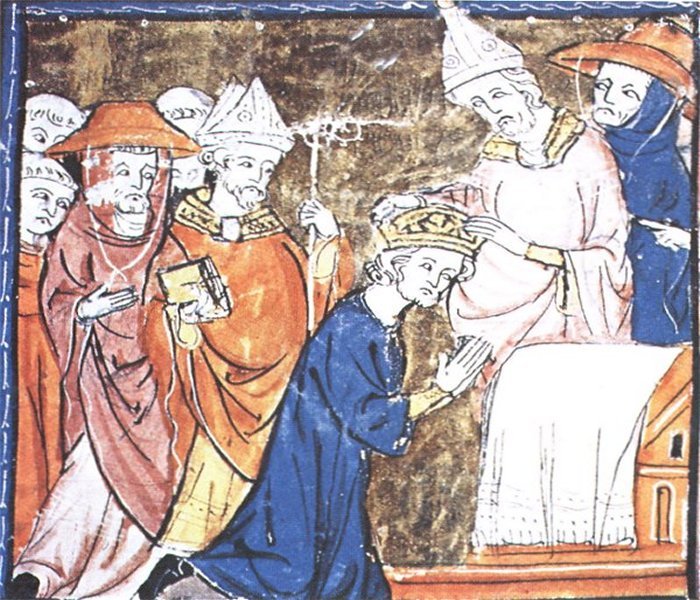Mystery Of The Controversial Phantom Time Hypothesis
Ellen Lloyd - AncientPages.com - One of the most intriguing and highly controversial theories dealing with ancient history is, without a doubt, the "Phantom Time Hypothesis."
The coronation of Charlemagne by Pope Leo III. source
According to this unconventional and thought-provoking theory, the Early Middle Ages (614-911 AD) never existed because the Western calendar was misdated.
German scientist Heribert Illig developed the Phantom Time Hypothesis. Another German researcher, Hans-Ulrich Niemitz, expanded on this theory after accidentally learning about the problem of faked documents in the Middle Ages.
In his science paper "Did the Early Middle Ages Really Exist?" Dr. Hans-Ulrich Niemitz points out that we can find medieval falsifications in every document. There are thousands of recognized forgeries from the Middle Ages. People forged wills, history texts, land deeds, and more. The Church falsified documents and relics regularly, too.
Since people didn't own clocks, they couldn't track days like we do today.
To find out what day it was, they asked a priest.
Early Middle Ages. Credit: Public Domain
These are facts that speak in favor of the Phantom Time Hypothesis.
"The easiest way to understand doubts about the accepted chronology and 'well-known' history is to systematize medieval research problems systematically.
It will lead us to detect a pattern that proves my thesis and gives reason to assume that a phantom period of approximately 300 years has been inserted between 600 AD and 900 AD, either by accident, misinterpretation of documents, or by deliberate falsification.
This period and all events that are supposed to have happened therein never existed. Buildings and artifacts ascribed to this period belong to other periods, "Dr. Hans-Ulrich Niemitz says.
The Western calendar should have been revised because Holy Roman Emperor Otto III, in collusion with Pope Sylvester II, wanted to celebrate the end of the first millennium 297 years earlier.
The scientists could elaborate further on the Phantom Time Hypothesis by examining several curious historical gaps.
"We looked for 'gaps' in special reports and publications, also for periods of stagnation or strange events repeated similarly after approximately 300 years. I only refer to some of a great number of puzzles: a gap in the history of the building in Constantinople (558 AD - 908 AD), a gap in the doctrine of faith, especially the gap in the evolution of theory and meaning of purgatory (600 AD until ca. 1100), a 300-year-long reluctant introduction of farming techniques (three-acre-system, and of war techniques (stirrup), a gap in the mosaic art (565 AD - 1018 AD), a repeated beginning of the German orthography etc. etc. The puzzles of historiography led the way, pointing out, again and again, the 'gap' which we soon termed 'phantom time.'"
One of the most startling proposals is that Charlemagne, also known as Charles the Great and widely recognized as the Father of Europe, was a fictional character who lived in an imaginary time.
According to Dr. Hans-Ulrich Niemitz, there are two reasons why the 'fakers' needed a phantom time of 297 years.
The Bust of Charlemagne, an idealised portrayal and reliquary said to contain Charlemagne's skull cap, is located at Aachen Cathedral Treasury, and can be regarded as the most famous depiction of the ruler. Image credit: Florian B. Gutsch - CC BY-SA 4.0
Hypothesis 1 states, "Otto III didn't live accidentally around 1000 AD; he had defined this date! He wanted to reign in this year because this suited his understanding of Christian millennialism. He explained this date with the help of his famous and well-versed friend Gerbert de Aurillac, later Pope Sylvester II.
In reality, they lived approximately seven hundred years after the birth of Jesus Christ, but only then had the years been reckoned 'after Christ.' Perhaps unaware of their error and without intending to falsify, they defined one particular year as '1000 AD' (Illig 1991). Consequently, chroniclers had to invent 300 years of history. To fill empty periods - what a great occasion for dynasties and kings!"
Hypothesis 2 states, "Constantine VII of Byzantium (905 - 959 AD) organized a complete rewriting of Byzantine history."
So, is the Phantom Time Hypothesis true? We do not know that.
It is impossible to tell now because this theory requires much more research. If the Phantom Time Hypothesis is correct, our calendar year was increased by 297 years without the corresponding passage of time. It means that our current year is not 2019 but 1722.
Written by Ellen Lloyd – AncientPages.com
Updated on Sep 25, 2023
Copyright © AncientPages.com All rights reserved. This material may not be published, broadcast, rewritten or redistributed in whole or part without the express written permission of AncientPages.com
More From Ancient Pages
-
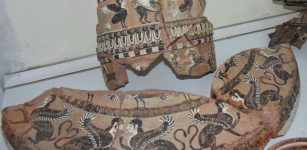 One Of A Kind 2,500-Year-Old Ritual Wash Basin Painted With Mythological Figures Discovered In The Ancient City Of Klazomenai
Archaeology | Oct 1, 2022
One Of A Kind 2,500-Year-Old Ritual Wash Basin Painted With Mythological Figures Discovered In The Ancient City Of Klazomenai
Archaeology | Oct 1, 2022 -
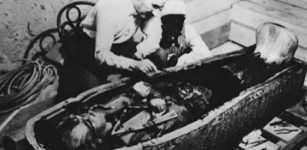 Howard Carter Stole Tutankhamun’s Treasures – Previously Unpublished Letter Reveals
Archaeology | Aug 15, 2022
Howard Carter Stole Tutankhamun’s Treasures – Previously Unpublished Letter Reveals
Archaeology | Aug 15, 2022 -
 Large Ancient Roman Necropolis Is Buried Beneath The Gaza Strip – Can It And Other Ancient Treasures Be Saved?
Archaeology | Jun 26, 2022
Large Ancient Roman Necropolis Is Buried Beneath The Gaza Strip – Can It And Other Ancient Treasures Be Saved?
Archaeology | Jun 26, 2022 -
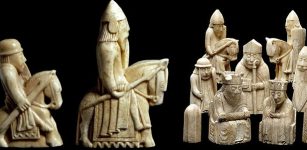 Mystery Of The Beautiful Viking Uig Chessmen Found On The Isle Of Lewis, Scotland
Artifacts | Dec 14, 2015
Mystery Of The Beautiful Viking Uig Chessmen Found On The Isle Of Lewis, Scotland
Artifacts | Dec 14, 2015 -
 On This Day In History: Adolph Bandelier Swiss-American Who Studied The American Indian Cultures – Born – August 6, 1840
News | Aug 6, 2016
On This Day In History: Adolph Bandelier Swiss-American Who Studied The American Indian Cultures – Born – August 6, 1840
News | Aug 6, 2016 -
 Hippocrates Didn’t Write The Oath, So Why Is He The Father Of Medicine?
Featured Stories | Oct 7, 2015
Hippocrates Didn’t Write The Oath, So Why Is He The Father Of Medicine?
Featured Stories | Oct 7, 2015 -
 Ancient DNA Reveals A Diverse Community Lived At Machu Picchu, The ‘Lost City Of The Incas’
Archaeology | Jul 26, 2023
Ancient DNA Reveals A Diverse Community Lived At Machu Picchu, The ‘Lost City Of The Incas’
Archaeology | Jul 26, 2023 -
 On This Day In History: The Gregorian Calendar Implemented – On Oct 5, 1582
News | Oct 5, 2016
On This Day In History: The Gregorian Calendar Implemented – On Oct 5, 1582
News | Oct 5, 2016 -
 ‘King Arthur’s Hall’ Is 4,000 Years Older Than Previously Thought
Archaeology | Nov 12, 2024
‘King Arthur’s Hall’ Is 4,000 Years Older Than Previously Thought
Archaeology | Nov 12, 2024 -
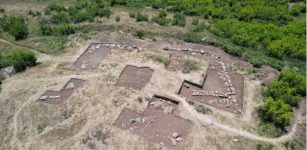 2,000-Year-Old Lost City Of Bassania Described By Roman Historian Livy Investigated By Archaeologists
Archaeology | Jun 21, 2022
2,000-Year-Old Lost City Of Bassania Described By Roman Historian Livy Investigated By Archaeologists
Archaeology | Jun 21, 2022 -
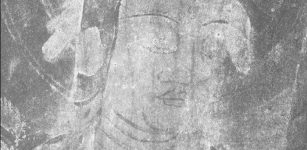 1,300-Year-Old Paintings Depicting Eight Buddhist Saints Revealed By Infrared Cameras
News | Oct 1, 2020
1,300-Year-Old Paintings Depicting Eight Buddhist Saints Revealed By Infrared Cameras
News | Oct 1, 2020 -
 On This Day In History: Independence Of Greece Is Recognized By The Treaty Of London – On May 7, 1832
News | May 7, 2016
On This Day In History: Independence Of Greece Is Recognized By The Treaty Of London – On May 7, 1832
News | May 7, 2016 -
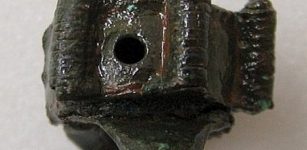 Bizarre Old Ring With License To Kill
Artifacts | Jun 29, 2014
Bizarre Old Ring With License To Kill
Artifacts | Jun 29, 2014 -
 Archaeologists Uncover More Hidden Ancient Secrets In Saqqara, Egypt
Archaeology | Jan 6, 2025
Archaeologists Uncover More Hidden Ancient Secrets In Saqqara, Egypt
Archaeology | Jan 6, 2025 -
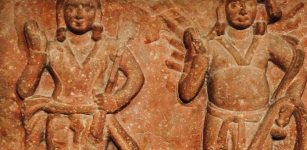 Agni: Hindu God Of Divine Illumination And One Of The Three Supreme Deities Of Vedic Lore
Featured Stories | May 3, 2018
Agni: Hindu God Of Divine Illumination And One Of The Three Supreme Deities Of Vedic Lore
Featured Stories | May 3, 2018 -
 Yet Another Beautiful Roman Mosaic In Hatay, Turkey
Archaeology | Jul 14, 2022
Yet Another Beautiful Roman Mosaic In Hatay, Turkey
Archaeology | Jul 14, 2022 -
 Mosaics Discovered In Ancient Galilean Jewish Village
Archaeology | Jul 10, 2018
Mosaics Discovered In Ancient Galilean Jewish Village
Archaeology | Jul 10, 2018 -
 Fatocuriosos.club Guilty Of Hundreds Of Copyright Violations Is Stealing Content Daily From AncientPages.com
News | Sep 22, 2022
Fatocuriosos.club Guilty Of Hundreds Of Copyright Violations Is Stealing Content Daily From AncientPages.com
News | Sep 22, 2022 -
 10 Remarkable Ancient Indian Sages Familiar With Advanced Technology And Science Long Before Modern Era
Featured Stories | Oct 19, 2015
10 Remarkable Ancient Indian Sages Familiar With Advanced Technology And Science Long Before Modern Era
Featured Stories | Oct 19, 2015 -
 Is Mysterious Pokaini Forest An Ancient Healing Center And Anomalous Zone?
Featured Stories | Aug 13, 2018
Is Mysterious Pokaini Forest An Ancient Healing Center And Anomalous Zone?
Featured Stories | Aug 13, 2018

